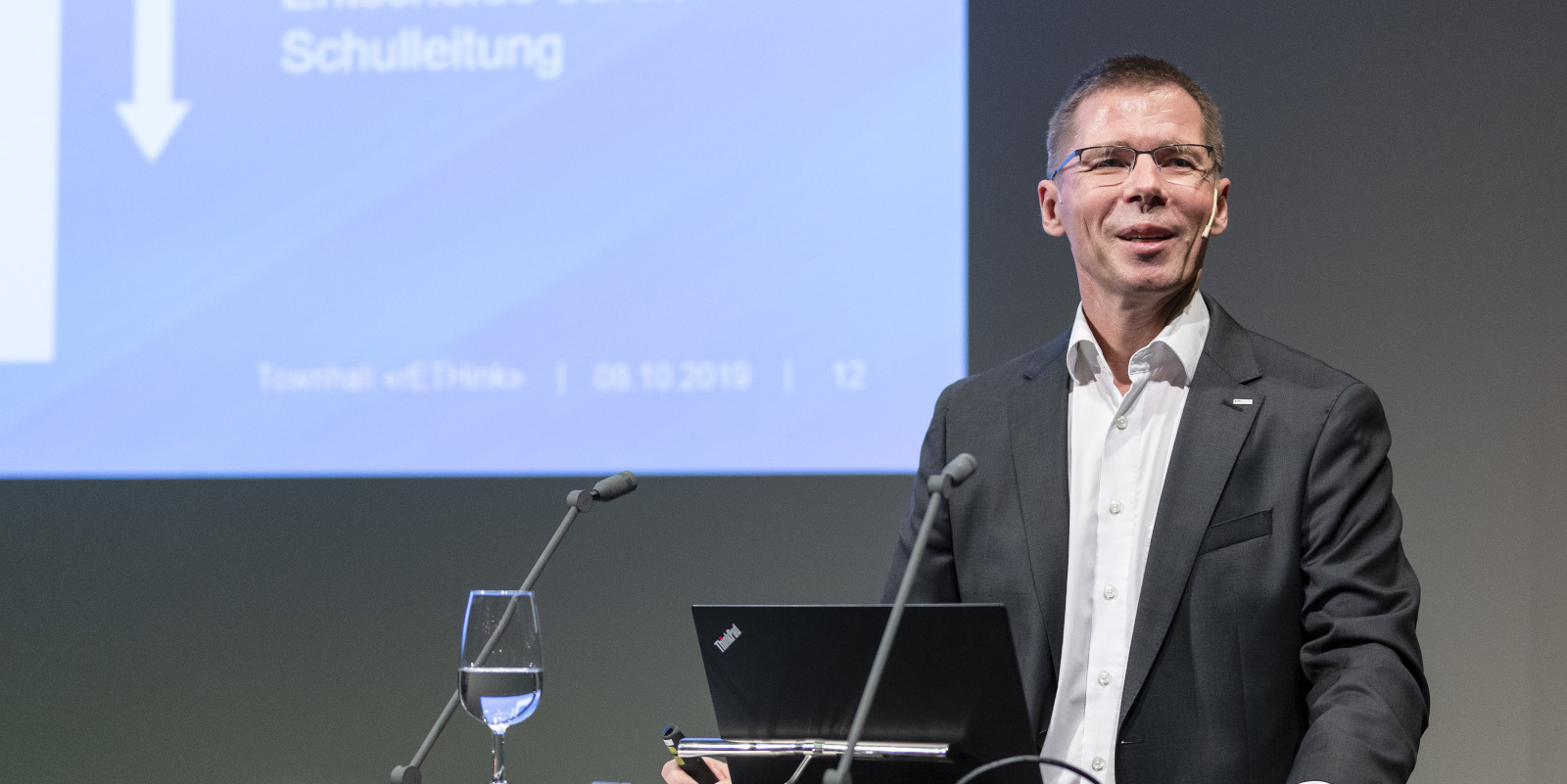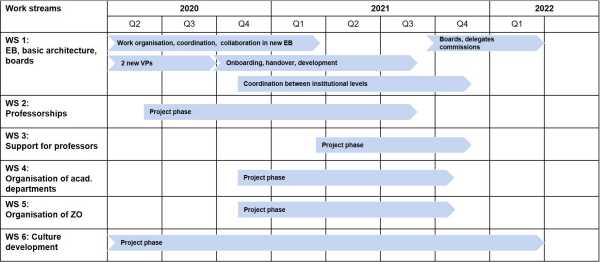«rETHink gives us the chance to learn lessons from the crisis»
The coronavirus pandemic has inevitably disrupted the ETH organisational development process "rETHink" as well. ETH President Joël Mesot explains the current status of the project and what he considers to be the major challenges at present.

Mr Mesot, you presented the rETHink project plan to ETH members at a Townhall meeting last February. Back then, no one could have predicted the massive impact the pandemic would have on our daily routine. How has this affected the project's progress?
Joël Mesot: It's caused significant delays, obviously. Fortunately, however, we have managed to get rETHink back on track and it's basically making good progress. Workstream 2, Professorships, and Workstream 6, ETH Culture Development, completed their kick-offs at the beginning of March. From the start of the lockdown till the end of April we virtually had to put the entire rETHink project on ice because all the university's administrative and academic departments had to focus all their efforts on the contingency arrangements for ETH emergency operations. Work has now restarted in Workstreams 2 and 6 – mainly via the web in view of current circumstances – and the pace has stepped up considerably. For example, the required basic data are already available in the Professorships workstream and three large blocks of work have been identified and allocated: one to fundamental issues, one to tasks such as outreach and institutional engagement, and one to leadership, collaboration and organisation. Workstream 6 is also about to initiate a broad discussion on the values that underpin our university. We are keen to identify the values we should live out today and those that we want to work towards in future.
What about the other workstreams?
We have had to delay the operational launch of Workstreams 4, Organisation of Academic Departments, and 5, Organisation of Central Administrative Units and Boards, by around three months. But preparations – such as recruiting the necessary personnel – are already under way, and we have pencilled in the start for the end of November. Workstream 3, which involves the development of instruments for supporting professorships, should commence in the first quarter of 2021 as per our original planning. I do not expect any delays here. On the other hand, I would have liked to have seen faster progress in Workstream 1, basic architecture of the Executive Board and Boards, in spite of the pandemic.
Last year the Executive Board pushed forward this workstream. How is the recruitment process going for the two newly created Executive Board functions?
Our original plan was to appoint the vice presidents for the two new Executive Board domains, Leadership & Personnel Development and Knowledge Transfer & Corporate Relations, in the first half of 2020 so they could start work in the second half of the year, but unfortunately that process has taken a little longer than we had hoped.
Why is that?
The potential candidates for such important and challenging leadership roles have to meet many different criteria and must be a perfect fit. Although we have considered many candidates with excellent qualifications, it has taken us a little more time than expected to find the perfect match. But I'm now confident that we can announce the two new Executive Board members by the autumn.
You've mentioned on several occasions that the coronavirus crisis also presents opportunities for the university's development. And that's also the goal of rETHink. Does the crisis help to accelerate organisational reform?
To some extent, yes. Major crises are unsparing. They cause enormous damage and personal dramas, but they are also a catalyst for necessary change. As a university, we need to draw the right conclusions and lessons from recent experiences. The consequences for teaching are already quantifiable. Our lecturers will continue to develop and improve their digital teaching concepts more rapidly, without neglecting classroom teaching. It's also clear that online provision – such as remote working and videoconferencing – should now be consistently embedded in our working structures. Last but not least, this period of emergency operation has shown us all how important it is for everyone in the ETH community to follow the same goals and offer each other mutual support.
Are there any other emerging developments?
We have already supported the promotion of digitalisation with subproject 5, Development of Central Administrative Units. The goal here is to deliver the most streamlined and efficient services and processes for the entire university.
When it comes to research and development, I have been impressed by how well ETH has played to its strengths during emergency operations and made some important and extremely valuable contributions in a very short time. To name a few: the SwissCovid App, the epidemiological studies for analysing the transmission paths of the virus, and the development of inexpensive ventilators targeted especially at developing countries. These successful outcomes have been possible because all those involved have shown massive engagement and team spirit and because we have a strong national and international network. This sets important markers for our future development. To this extent, the rETHink project came at just the right time. It allows us to learn lessons from the coronavirus crisis.
One feature of the rETHink project is its participatory character. Is it possible to maintain this principle if physical meetings are still restricted for the foreseeable future?
That's a crucial point. Broad-based collaboration and support are vital for the success of the rETHink project, as the assumption of individual responsibility is a key component in ETH's culture. We can only continue to develop our organisation with the involvement of ETH members at all levels and in all areas of the university. And as I said already, collaboration and work in the individual project teams is now definitely more challenging, but no less productive. I urge all interested members of the ETH community not to be shy. Use the opportunity to help shape rETHink and thus the future of our university!
Where do you see concrete opportunities to get involved?
In the "Professorship" workstream, for example, more than 100 ETH members in total are potentially included in the focus groups alone, with the aim of providing useful insights into this topic. We want to create similar focus groups for feedback for other workstreams as well. If you are interested, get in touch with the representatives of your student or staff associations and let them know which area you would like to be actively involved in. I look forward to positive contributions from as many people as possible.
The rETHink project is moving forward again. What are the main priorities and challenges over the coming period?
The need for our university to continuously develop is something that the ETH community has to buy into and become involved in actively shaping this process. The necessary momentum has to come from the Executive Board, along with the project management team and their colleagues in charge of the individual workstreams. This will require a huge effort, and above all a lively dialogue – something I am looking forward to and believe will definitely enrich us all.

Comments
No comments yet